- Home
- Joan Lowery Nixon
A Place to Belong
A Place to Belong Read online
This book made available by the Internet Archive.
A Note From the Author
During the years from 1854 to 1929, the Children's Aid Society, founded by Charles Loring Brace, sent more than 100,000 children on orphan trains from the slums of New York City to new homes in the West. This placing-out program was so successful that other groups, such as the New York Foundling Hospital, followed the example.
The Orphan Train Quartet was inspired by the true stories of these children; but the characters in the series, their adventures, and the dates of their arrival are entirely fictional. We chose St. Joseph, Missouri, between the years 1860 and 1880 as our setting in order to place our characters in one of the most exciting periods of American history. As for the historical figures who enter these stories—they very well could have been at the places described at the proper times to touch the lives of the children who came west on the orphan trains.
Hi^^p^+uy '''7^
A number of the CHILDREN brought from
?fSV YORK are atUl without homes.
rptKMM num tv.t. r«i >tim im F4*f.
3A1& A2TO SEE THEM.
SIBOHANTS, FARMIXS
AND FRIENDS GENERALLY i re requested to give publiolty to the above
i H.
GEN, Agent
Jennifer Collins raced down the stairs, nearly colliding with her grandmother. "You can't go jogging because it's raining," Jennifer said, "so could you read some of Frances Mary's journal and tell us now— right now —about Danny and Peg and why they couldn't write letters to anyone, and about the attempted kidnapping, and—"
Grandma Briley laughed and held up a hand. "Slow down," she said. "You haven't even had breakfast yet."
"I'll eat fast," Jennifer promised.
Her twelve-year-old brother, Jeff, sauntered into the hall just behind Grandma. "It's oatmeal," he mouthed, as he rolled his eyes and grimaced.
"Even if we're having oatmeal," Jennifer solemnly added.
"You might try it with brown sugar, cinnamon, and butter," Grandma said. "Jeff liked it so much that he ate two helpings. Isn't that right, Jeff?"
"Yeah, I guess I did," Jeff mumbled, looking embarrassed.
1
"Butter on oatmeal? That sounds strange," Jennifer said.
"That's the old-fashioned way to serve oatmeal," Grandma answered. "I think a recipe from long ago will get you ready for a story that took place in 1860. Don't you?"
Jennifer smiled. She already felt a close relationship with Frances Mary Kelly. Frances, Jenny's great-great-great-grandmother, had written the stories about her trip to the West with her brothers and sisters on one of the orphan trains.
When she had first introduced Jennifer and Jeff to Frances and her journal, Grandma had combed Jennifer's long dark hair into the style worn by Frances so that she would look even more like Frances's photograph. Each time Jennifer had studied the photograph or held Frances's faded blue journal, she had felt a peculiar kind of tingle, as if there were a special bond between them.
"Come with me," Grandma said. "I'll be chef in charge of the oatmeal, and you can pour yourself a big glass of orange juice. The kitchen's as good a place as any to tell Danny's and Peg's story."
It took just a few minutes for Grandma, Jeff, and Jennifer to settle around the kitchen table. Jennifer took a tentative bite of the oatmeal and was surprised to find that she liked it. She watched Grandma gently open the cover of the journal and turn to the page that began Danny's story.
"As I've done before, I'll read just a few paragraphs of Frances's own words," Grandma said. "Then I'll tell you the rest of the story. Are you ready?"
"Yes!" Jennifer and Jeff answered together, so Grandma tilted the journal to the light and began to read the faint, spidery writing.
As I stared back at all those people who had come
to look over the children from the orphan train and perhaps choose one, I hoped with all my might that Danny and Mike would find a home together.
Danny, at ten, was tall and strong for his age and had a careful, well worked out answer for everything. He carried his shoulders back and his chin high "Stubborn," a few people said about him. "Determined, " said others. Everyone agreed, however, that eventually he'd do well for himself. But I saw a vulnerable side of Danny most people couldn't see, and I wasn't as sure.
When Danny was only seven, Da had overheard him explaining to Mike an elaborate escape route back to our home, "just in case those big blokes from Seventeenth Street ever decide to come after us." Da had laughed and said to Ma, "You'll never have to worry about Danny. If the fates ever choose to deal the boy a bad hand, they'll find him well prepared to take care of the problem."
And later, when he had grown old enough to work as a shiner, Danny had come home limping a bit, tugged off his right boot, and proudly dumped a handful of pennies on the table. He had rubbed his sore right foot as he announced, "Those bullies on the Avenue aren't going to get my hard-earned coppers!" Ma had smiled and tousled his curly brown hair, calling him, "My careful, cautious child."
Danny had been very close to Da, and he had suffered terribly the loss of a father when Da died. It wasn't long before he'd attached himself to Mike, and no one could even waggle a scolding finger in Mike's direction without Danny jumping to Mike's defense. Mike — only a year older and an inch shorter than Danny — had such a ready sense of mischief that he seemed an unlikely one to take on the job of father.
Would Da be proved right about Danny? I didn't know. When we learned from the people at the Children's Aid Society that we'd probably be separated and placed with different families, I'd seen the shock and terror in Danny's eyes. He'd edged close to Mike, and I'd heard him say, his voice quivering, 'We'll stick together, you and me, huh, Mike?"
I would have given anything to be able to promise Danny then and there that his fear of being parted from his brother was groundless. But I couldn't promise. I didn't know what would happen until that day in the church when a kind couple chose Danny and Peg together. It was a boy and a girl they had come looking for, and there was no room for Mike.
When it was time to leave, little Peg, only seven years old, herfaee wet with tears, took her foster mother's hand trustingly, but Danny — oh, how I ached to see the misery on his face as he said good-bye to Mike
( You'll have a good home with these people," I'd told Danny with all the confidence I could muster. But a nagging part of my mind kept scolding, "How can you speak so bravely? How can you possibly know that your words are the truth?"
Daniel James Kelly took his sister's hand and held it tightly. "Stop sniveling, Peg," he ordered. "You don't have to be afraid anymore."
Peg looked up at him and tried to speak, but out came a strangled sob. Her cheeks were streaked with tears, and her eyelids were swollen and red.
Danny felt as miserable as Peg looked. He had convinced himself that he understood why Ma had sent her children west on the orphan train, but now his throat hurt and his eyes stung as he thought about the dream that had ended.
It had been his own dream, one that he hadn't dared share with anyone—even with Mike.
Even though Da had died more than two years earlier, Danny still remembered vividly his father's touch and smile. After a long while, although he still missed Da terribly, the dream began. He'd begun to hope with all his heart that someday his mother would marry again
and give him another father. There was a huge, empty place in his life that only a father could fill.
But all that was in the past, and now he and Peg were going to live with strangers.
Andrew MacNair, the tall scout who had brought them from New York City to St. Joseph, Missouri, on the orphan train, stepped forward to say good-bye to Danny and Pe
g and to the foster parents who had offered them a home. He handed Alfrid Swenson the tightly wrapped bundle that contained Danny's and Peg's belongings. 'Til pay you a visit in about six months," he said. "Have a safe trip home."
Alfrid Swenson was tall and bony. His sparse, pale blond hair topped blue, solemn eyes set in a deeply sunburned face. Alfrid spoke pleasantly to Peg and Danny, but Danny wondered if he ever smiled.
Olga Swenson, on the other hand, had the crinkle lines around her mouth and eyes that came from laughing. Her skin was as pale as the white paper flowers which girls sometimes sold on the street corners in New York. She was tiny and clutched her black wool shaw r l around her shoulders as though even her bones were cold.
{Catherine Banks, who lived in St. Joseph and had been on the train with them, rushed up to Danny and Peg for a last hug good-bye. While Olga stopped to chat with Katherine, Alfrid leaned down to speak quietly to Danny and Peg.
"My wife's health is fragile," he said. "I want her to feel well and strong again. I thought long and hard about what would be best for Olga, and I decided that the laughter of children would be the medicine that would help her most."
Danny nodded. He was heartbroken at having to leave his brothers and older sisters and terrified about going away with strangers, yet at the same time he was terribly
~6~
afraid that no one would want him and Peg. "You'll find us to be cheerful, sir," he said bravely. "Peg is ftdl of good humor, always able to bring a smile to our mother's face." He gave Peg a poke.
But Peg, hanging tightly on to his hand, her head pressed against his shoulder, gave another hiccuping sob. If Alfrid Swenson wanted laughter, Danny didn't see how in the world he could have picked a less likely pair.
Olga stepped forward and, like a bird tucking a chick under her wing, suddenly enfolded Peg in her black wool shawl, until all that could be seen of Peg was the flaming topknot of her curly red hair. "Come," she soothed. "You're tired, and it's time to take you home."
"Our farm isn't far from St. Joseph," Alfrid told them, as he led the way out of the church and down the street. Danny's curiosity overrode his fear as he stared at the passersby—men dressed in buckskin or in heavy cotton work clothes; women in hoopskirts and small, flowered hats or simple, dark print dresses topped with woolen shawls; buggies, horseback riders, and wagons, large and small, that rumbled and rattled over the deep ruts in the street.
They came to a grand, five-story building with a sign in front that proclaimed it The World's Hotel. Olga, her arm still around Peg, stopped in the middle of the sagging wooden sidewalk. "Alfrid," she said, "let's stop in the hotel for a hot cup of tea before we begin our ride home."
"If that's what you wish," Alfrid replied, and looked at his wife with tenderness. Danny remembered his own father sometimes looking at Ma like that, and the ache in his throat grew worse.
Excitement tipped Olga's cheeks with pink and added a lilt to her voice as she said to Danny and Peg, "The lobby of the hotel is a beautiful place with red Brussels carpets. I want you to see it."
Peg's eyes widened as they entered the huge, paneled lobby with its wide, winding staircase. "It's like a castle in the fairy tales Da told us," she whispered, awestruck.
"And you're the princess," Olga said. "With that blue ribbon matching the blue in your eyes, you're the loveliest little girl I've ever seen."
The dimple in Peg's right cheek flickered, and she stood a little taller. "Can I have sugar in my tea, ma'am? Real sugar?" she asked.
"Of course," Olga said. She led the way between the groups of people who milled through the lobby. Danny stared admiringly as two narrow-waisted women with red cheeks and lips passed him. Their bright dresses had wide skirts held out with hoops, and Danny had to jump aside to get out of the way.
"They're actresses," Olga told Danny and Peg in a low voice. "They're with a traveling theater company that's stopping here on the way to St. Louis."
Peg twisted to stare at the women, and Olga gave Peg's hand a little tug.
A man with a deep, resonant voice called to the two women and strode toward them. Each word was distinct and as musical as though it had been rung by a bell. He was not a tall man, but he held himself so that he seemed tall. As he conversed with the women, he postured and posed, obviously aware that many people in the hotel lobby were watching him.
Alfrid scowled. "I don't like that fellow," he muttered to Olga. "Artemas Gund heard him declaiming in the Buffalo Saloon. He's a rabid Southern sympathizer and antiabolitionist."
"What's that?" Danny asked.
"A man who believes in slavery," Alfrid explained, "and who makes his feelings known even when they are not wanted or asked for."
Danny shivered and looked away from the man. Da
had taught them that slavery was terribly wrong. Life was hard enough without having to belong to somebody else. Danny couldn't imagine being forced to work his whole life for someone who could do whatever he wanted with him. "Do people listen to him?" he asked.
"Only those as foolish as he." Olga sniffed. "The fellow is just an actor—no one important."
"What's his name?" Danny asked.
"Booth," Alfrid said. "John Wilkes Booth."
"Enough of those people," Olga interrupted. "Let's have our tea, and some shortbread cookies with it."
"Cookies?" Peg's expression flashed from delight to concern. "Danny loves cookies, but I do, too," she said. "Don't let him eat them all."
Olga smiled, and Danny began to relax. If they couldn't be with their own mother, at least they were with people who seemed kind.
Suddenly someone shoved past Danny, and he stumbled, regaining his balance. "Hey!" Danny exclaimed.
But the heavyset man who had been responsible neither saw nor heard Danny. He had stomped across the lobby to face John Wilkes Booth. Danny couldn't hear what the two men were saying to each other, but anger had darkened their faces.
Olga edged close to Alfrid. "True gentlemen would remember their behavior while in a public place," she murmured.
Alfrid put a hand on her arm, and there was sadness in his voice as he said, "True gentlemen would not be so ready to divide our country."
An anxious-looking man in a gray coat rushed to intercede. Danny heard him say sternly, "Gentlemen! I must ask you to leave this hotel. You will have to continue your conversation outside." Booth and the man who had confronted him didn't answer. They simply
turned toward the main doorway and strode from the lobby.
Olga shooed Danny and Peg toward the restaurant, but Danny carried with him the image of the terrible hatred that had twisted both men's faces and burned in their eyes.
The Swensons' house was south of St. Joseph, on a rise high above the Missouri River. The low hills rolled to the west and north, the river gleamed beyond them, and thick woodland crowded to the south and east edges of the fields.
Danny's mouth fell open at the sight of the two-story house that rose, gleaming white, at the peak of the highest hill. At each side of the front porch were two tall decorative columns, and he could see a brick chimney rising from the shake roof at each end of the building.
Real fireplaces! Danny thought, hunching his shoulders in a happy hug. Back in New York City, he had sometimes paused in front of one of the elegant houses along the avenues to peer inside before someone saw him and closed the heavy draperies. On cold days, as he'd glimpsed the warm golden and orange flames, he'd wished he could know what it would be like to sit in
u
front of a cozy fire and be truly warm. Now he would know!
The barn was large and to the south of the house, separated from the house only by a double width of the drive. As they neared the barn, and Alfrid pulled the horses to a halt, Danny could see the nearby privy and well beyond the house. Close to the barn was a chicken house, and behind it, dotting the edge of a recently harvested field, was a row of tall haystacks. The tingling smell of the sun-dried hay blended with the rich earthy fragrance f
rom the meadows, and Danny breathed it in deeply.
Suddenly he caught sight of a vegetable garden. "A real garden!" Danny exclaimed. U I recognize the squash. IVe seen squash like that in the markets."
Peg's eyes were wide as she stared where Danny was pointing. "Squash grows on the ground?" she asked. "With those big leaves?"
Danny poked her. "Where did you think it grew? On trees?"
Peg shrugged and thought a moment before she solemnly answered, "IVe never had a single think about squash."
Olga giggled, lifted Peg over her lap, and handed her down to Alfrid. "You may help plant our next garden. Would you like to plant some squash?"
Peg ducked her head to hide her mischievous smile. "Oh, yes!" she said. "As long as I never have to eat it!" Olga took Peg's hand, and they laughed as they hurried toward the house.
Danny was a little shocked at Peg's ready laughter. Could Peg have forgotten Frances and Megan and Mike and Petey and Ma—especially Ma—so soon that she could be happy without them?
She's only seven, he reminded himself. You do want her to be happy, don't you? The answer that flashed into
his mind was a grudging, Yes. But not yet, and he squirmed, uncomfortable with his own thoughts.
Quickly he jumped from the buggy, ready to follow Olga and Peg, but Alfrid put a hand on his shoulder. "Wouldn't you like to lend me a hand with the horses?"
"Oh! Y-yes, sir!" Danny stammered, embarrassed at appearing ignorant or—even worse—lazy.
Alfrid patted Danny's shoulder, then took a grip on the reins and clucked to the pair of matched brown horses, which were still hitched to the buggy. "You're not used to farm life yet," he said. "I would be just as lost and unknowing as you are right now if I were suddenly set down in New York City."
Danny followed behind the buggy, grateful for Alfrid's words of kindness. He did feel lost. How was he to know what he was supposed to say or do?

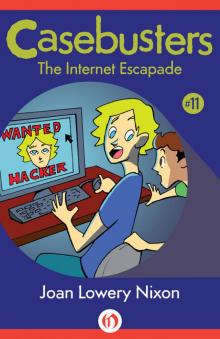 The Internet Escapade
The Internet Escapade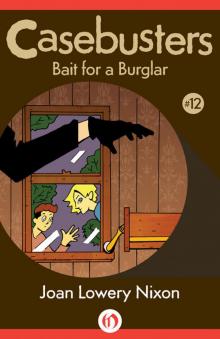 Bait for a Burglar
Bait for a Burglar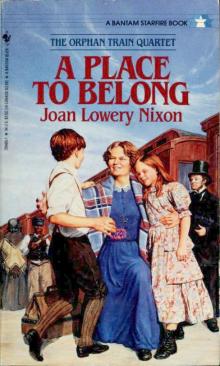 A Place to Belong
A Place to Belong Nightmare
Nightmare Sabotage on the Set
Sabotage on the Set The Other Side of Dark
The Other Side of Dark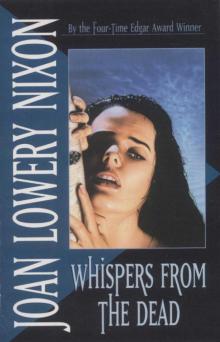 Whispers from the Dead
Whispers from the Dead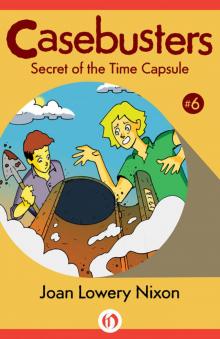 Secret of the Time Capsule
Secret of the Time Capsule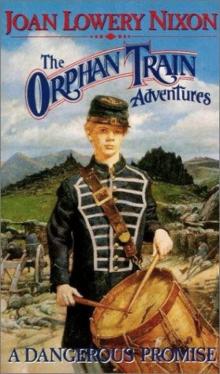 A Dangerous Promise
A Dangerous Promise Laugh Till You Cry
Laugh Till You Cry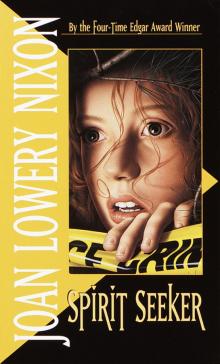 Spirit Seeker
Spirit Seeker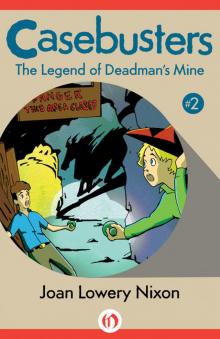 The Legend of Deadman's Mine
The Legend of Deadman's Mine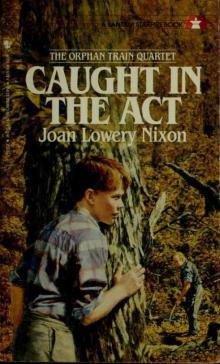 Caught in the Act
Caught in the Act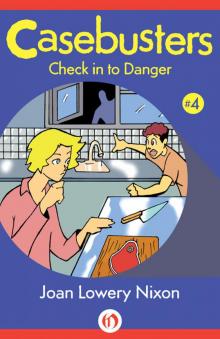 Check in to Danger
Check in to Danger Ellis Island: Three Novels
Ellis Island: Three Novels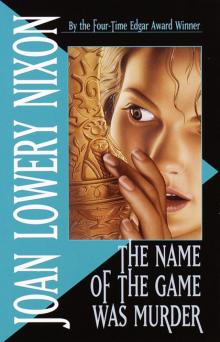 The Name of the Game Was Murder
The Name of the Game Was Murder The Haunting
The Haunting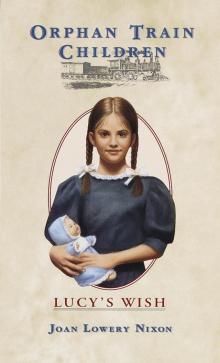 Lucy’s Wish
Lucy’s Wish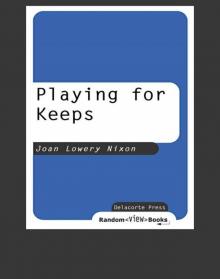 Playing for Keeps
Playing for Keeps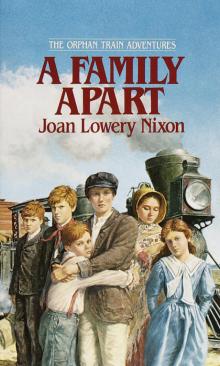 A Family Apart
A Family Apart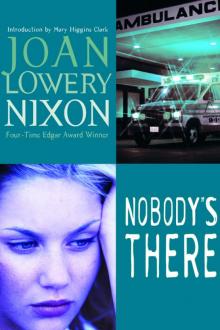 Nobody's There
Nobody's There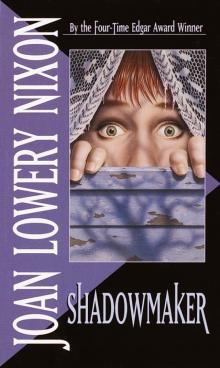 Shadowmaker
Shadowmaker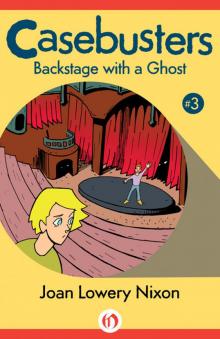 Backstage with a Ghost
Backstage with a Ghost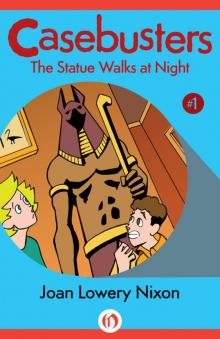 The Statue Walks at Night
The Statue Walks at Night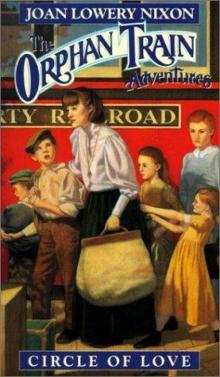 Circle of Love
Circle of Love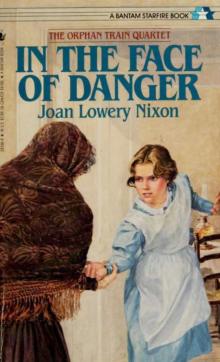 In the Face of Danger
In the Face of Danger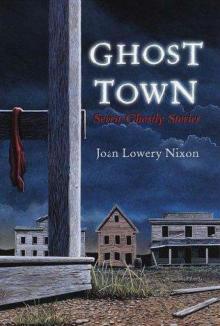 Ghost Town
Ghost Town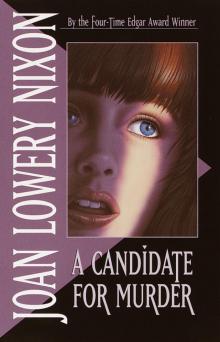 A Candidate for Murder
A Candidate for Murder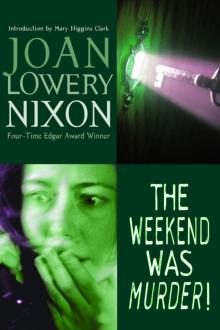 The Weekend Was Murder
The Weekend Was Murder The Island of Dangerous Dreams
The Island of Dangerous Dreams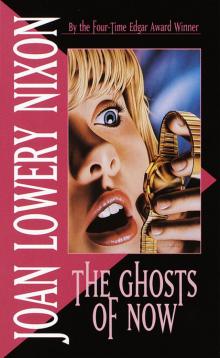 The Ghosts of Now
The Ghosts of Now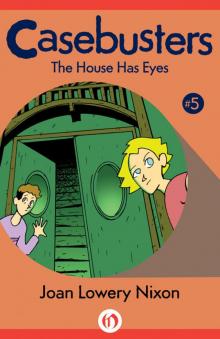 The House Has Eyes
The House Has Eyes The Dark and Deadly Pool
The Dark and Deadly Pool Keeping Secrets
Keeping Secrets Secret, Silent Screams
Secret, Silent Screams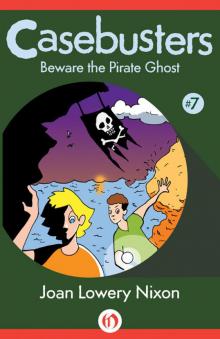 Beware the Pirate Ghost
Beware the Pirate Ghost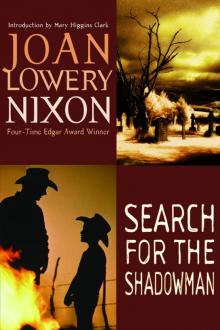 Search for the Shadowman
Search for the Shadowman Haunted Island
Haunted Island